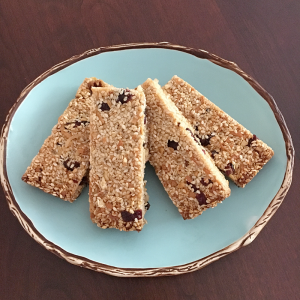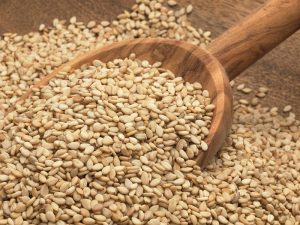 Although beloved on bagels, breadsticks and hamburger buns, many folks can’t say why sesame seeds are good for health. Too tiny to make a difference? Too much of a “topping” to warrant investigation? Too common to think twice about? Whatever the reason (and I’ve been guilty of all three), it’s time to say “open sesame” to all that makes this small seed so big on nutritional benefits.
Although beloved on bagels, breadsticks and hamburger buns, many folks can’t say why sesame seeds are good for health. Too tiny to make a difference? Too much of a “topping” to warrant investigation? Too common to think twice about? Whatever the reason (and I’ve been guilty of all three), it’s time to say “open sesame” to all that makes this small seed so big on nutritional benefits.
1 Bone-building minerals. It’s remarkable how sesame seeds’ most abundant minerals — copper, manganese, magnesium and calcium — all contribute to bone health in some important way. With osteopenia bearing down on my rickety bones, I’m always on the lookout for calcium sources. Individually, copper helps make red blood cells and promotes healthy connective tissues; manganese is needed for digestion and nerve function; magnesium contributes to energy production; and calcium keeps our blood clotting and our hearts thumping.
2 Heart-healthy fiber. Mention fiber and “regularity” often comes to mind first, which is indeed a good thing! But there’s so much more to this valuable nutrient. Current research shows that adding more fiber to your diet may lower blood pressure, improve blood cholesterol levels and reduce the inflammation closely linked to all stages of atherosclerosis. Also, dietary fiber may help control diabetes. Just two tablespoons of sesame seeds provide about 4 grams of fiber (as much as one apple).
3 Cholesterol-lowering phytosterols. Sesame seeds are loaded with phytosterols, those beneficial plant compounds that have been scientifically proven to lower cholesterol. Their benefits are so significant that foods are often fortified with phytosterols. Of course, having lower cholesterol levels leads to other benefits, such as a reduced risk of heart attacks and stroke. Antioxidant-rich phytosterols have also been found to help protect against the development of certain cancers.
4 Good-for-you fats. Sesame seeds are no slouch in the fat department, with just a few tablespoons serving up about 13 grams of fat. Thankfully, most are good fats — the mono and polyunsaturated fats. These fats help the body absorb nutrients and vitamins A, D, E and K that are vital to vision, strong bones and nerve development. They also help regulate hormones and body temperature and keep our skin, nails and hair in tiptop shape.
Sesame Bars with Walnuts, Coconut and Dried Cranberries
Adapted from Bon Appetit
1¼ cups white sesame seeds
¾ cup unsweetened shredded coconut
¼ cup chopped walnuts (or nut of choice)
½ teaspoon kosher salt
¼ cup honey
2 tablespoons tahini (sesame paste) or creamy peanut butter
½ teaspoon vanilla extract
½ cup dried cranberries or raisins
Preheat oven to 350°. Lightly oil an 8×8” baking pan; line with parchment paper or nonstick foil, leaving a generous overhang on all sides. Mix sesame seeds, coconut, nuts, and salt in a large bowl. Mix honey, tahini or peanut butter, and vanilla in a small bowl. Add to sesame seed mixture and mix well. Stir in cranberries.
Scrape mixture into prepared baking pan; press firmly into an even layer. Bake until golden brown around the edges, about 20 minutes. Transfer to a wire rack and let cool until firm, 30–40 minutes. Lift out of baking pan (if it starts to crumble, let cool longer) and cut into bars or squares. Let cool completely. Store at room temperature or in fridge.
 Helpful tips:
Helpful tips:
If buying sesame seeds from bulk bins, take a whiff and a gander: they should smell fresh and be free of any moisture. Store hulled seeds, which are more prone to rancidity, in the fridge or freezer; unhulled seeds can be stored in an airtight container in a cool, dark place. Boost your consumption of this nutritious seed by adding it to baked goods, meatloaf and stews, and by sprinkling it on vegetables, meats, noodles and more.
Anne Palumbo is a lifestyle columnist, food guru, and seasoned cook, who has perfected the art of preparing nutritious, calorie-conscious dishes. She is hungry for your questions and comments about SmartBites, so be in touch with Anne at avpalumbo@aol.com.

